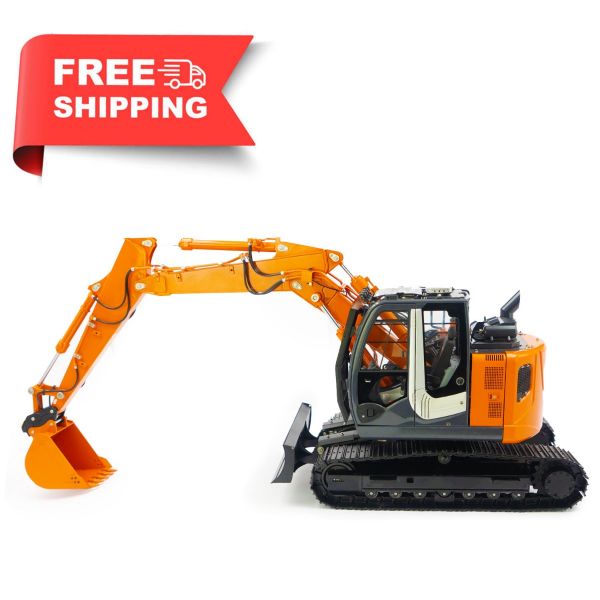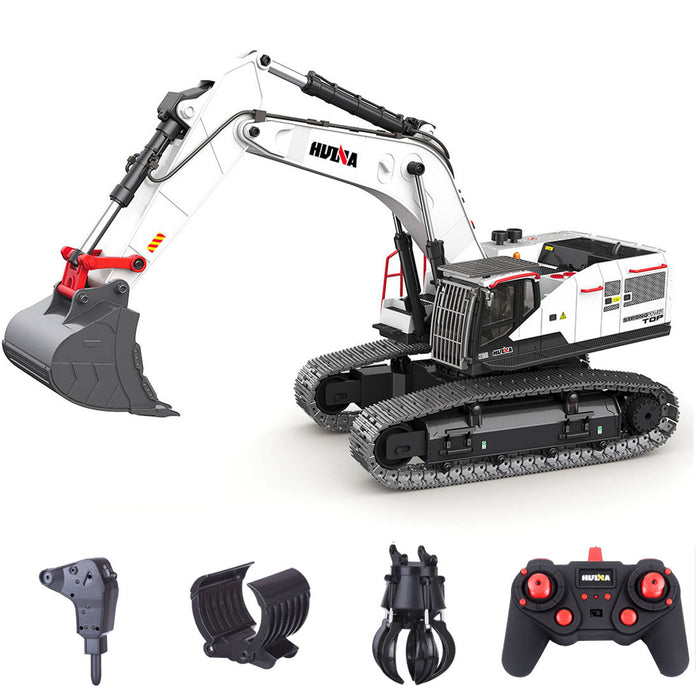Understanding Exactly How Excavator Works and Its Influence On Effectiveness
Excavators play a necessary duty in construction and mining operations, counting on an intricate interaction of hydraulic and mechanical systems. Their capacity to execute a selection of tasks pivots on both their layout and the technology incorporated within. Understanding these parts can substantially affect operational efficiency and productivity. As innovations proceed to improve the industry, one have to think about just how these modifications will influence future techniques and performance.
The Essentials of Excavator Mechanics

The Duty of Hydraulic Systems in Excavators
At the heart of excavator procedure lies the hydraulic system, which plays a critical role in powering the machine's features and activities. This system makes use of pressurized hydraulic fluid to transfer energy, enabling various activities such as excavating, training, and moving. By harnessing the principles of hydraulics, excavators can carry out jobs with exceptional precision and force, enhancing total functional efficiency.The hydraulic system contains essential components, including cyndrical tubes, valves, and pumps, which work together to control the flow and instructions of the liquid. When the operator engages the controls, the hydraulic fluid is guided to certain cyndrical tubes, equating the operator's commands into physical movement. This device enables smooth and receptive activities, which are important in building and construction and excavation atmospheres. double e volvo rc excavator. The effectiveness of the hydraulic system straight affects the performance and convenience of the excavator, making it a crucial component in modern excavation procedures
Secret Elements of an Excavator
Understanding the essential components of an excavator is vital for comprehending how this effective maker runs. An excavator includes numerous considerable aspects, consisting of the undercarriage, home, container, boom, and arm. The undercarriage provides stability and wheelchair, frequently featuring tracks or wheels to navigate various terrains. Your home has the engine and hydraulic systems, allowing the operator to manage activity and power the equipment. The boom prolongs from your house, allowing vertical reach, while the arm connects to the pail, facilitating excavating and training operations.Additionally, the taxicab houses the driver, geared up with controls for precise maneuvering. Each of these elements plays a vital function in the excavator's overall performance, adding to its effectiveness and performance on building websites. Understanding these components helps in maximizing and keeping excavator efficiency, making sure jobs are finished safely and efficiently.
Accessory Adaptability and Its Advantages
Add-on flexibility is a crucial facet of excavators, enabling drivers to switch over in between various devices tailored for details jobs. This adaptability not only improves work performance but likewise adds to cost-effectiveness by lowering the demand for multiple devices. Understanding the various sorts of attachments offered can significantly influence the total efficiency and functionality of an excavator on work websites.
Types of Add-ons
While excavators are largely acknowledged for their digging abilities, their real versatility depends on the wide range of attachments offered. These attachments boost the excavator's performance, permitting it to execute numerous jobs past excavation. Typical add-ons consist of pails (for excavating and scooping), hydraulic thumbs (for realizing materials), and augers (for drilling openings) Grapples are made use of for dealing with and relocating debris, while rippers can separate tough surfaces. Other specialized add-ons, such as plates and plows, allow excavators to adapt to particular task needs. This diversity not only increases the equipment's energy across various sectors, consisting of building and construction, demolition, and landscaping, yet likewise allows drivers to tailor their tools to meet certain task demands successfully.
Enhanced Task Performance
Maximizing task performance is a main advantage of utilizing various excavator accessories. Various attachments allow an excavator to execute multiple tasks without requiring to switch tools, saving useful time and labor. For instance, making use of a hydraulic hammer can break concrete while a container attachment can excavate dirt, enabling a smooth workflow. This versatility minimizes downtime linked with equipment modifications and boosts productivity on-site. Additionally, specialized accessories boost precision in tasks such as grading or landscaping, resulting in better results. The ability to adapt to different work requirements not only streamlines operations however likewise minimizes the demand for additional machinery, guaranteeing that jobs are finished promptly and effectively. In general, accessory versatility considerably contributes to enhanced job performance in excavation job.
Cost-Effectiveness and Adaptability
Cost-effectiveness is a substantial benefit of making use of versatile excavator add-ons. These attachments enable a single excavator to carry out numerous tasks, reducing the demand for additional machinery and labor - double e volvo rc excavator. By switching between containers, hammers, and grapples, drivers can tackle various jobs, from excavating to demolition, thus taking full advantage of tools application. This flexibility not only decreases operational expenses however additionally lessens downtime related to altering equipment. In addition, the ability to tailor excavators with specialized add-ons improves performance, as they can efficiently manage diverse tasks according to job demands. To conclude, the combination of cost-effectiveness and flexibility in excavator accessories adds to enhanced functional efficiency and source allotment in building and excavation projects

Advanced Innovation in Modern Excavators
Modern excavators are significantly outfitted with innovative innovation that transforms excavation procedures. Automation enhances operations, while boosted gas effectiveness decreases functional expenses. Additionally, clever control systems enhance precision and safety and security, marking a significant advancement in excavation tools.
Automation in Excavation Processes
As excavation technology evolves, automation has actually emerged as a crucial part in boosting performance and accuracy on work sites. Modern excavators are equipped with advanced automated systems that promote tasks such as grading, digging, and trenching with very little driver treatment. These systems make use of sensors, GPS, and artificial intelligence formulas to assure precise positioning and deepness control, significantly lowering the margin for error. Additionally, automation enables drivers to concentrate on tactical decision-making instead of hand-operated controls, bring about improved efficiency overall. Such innovations not only simplify operations but likewise boost safety and security by decreasing human error in complicated operations. As a result, the integration of automation in excavation processes represents a considerable advancement in construction innovation, driving the industry towards greater performance and efficiency.
Improved Gas Efficiency
Advancements in technology have additionally resulted in substantial renovations in fuel performance for contemporary excavators. Modern makers are furnished with sophisticated engines that enhance power result while minimizing gas usage. These engines make use of cutting-edge combustion innovations, such as turbocharging and direct gas shot, to improve performance and performance. In addition, lightweight products in building lower overall weight, enabling much less power expense throughout operation. The introduction of variable rate controls enables drivers to change engine performance according to details jobs, even more reducing gas usage. Consequently, these improvements not only reduced functional costs yet likewise contribute to ecological sustainability by lowering discharges. Overall, boosted fuel efficiency in excavators is an important growth that reinforces productivity and economic viability in the building market.
Smart Control Systems
While drivers browse progressively complicated task sites, clever control systems in excavators have become crucial tools for enhancing effectiveness and accuracy. These sophisticated innovations utilize formulas and sensors to monitor different criteria such as lots weight, terrain conditions, and operational performance. By automatically web link readjusting hydraulic functions, wise systems maximize device efficiency, leading to enhanced performance and reduced wear on parts. Furthermore, drivers profit from intuitive interfaces that provide real-time responses and diagnostics, enabling notified decision-making. This integration of innovation not just streamlines procedures but likewise reduces human mistake, adding to more secure workplace. As the building industry proceeds to evolve, smart control systems will certainly play a vital role in shaping the future of excavator effectiveness and performance.
Enhancing Operational Effectiveness With Excavators
Excavators play an essential duty in boosting operational effectiveness across different construction and excavation projects. Their convenience enables several tasks, including digging, material, and training handling, which streamlines operations and lowers the demand for added tools. With powerful hydraulic systems, excavators can carry out durable tasks with precision, significantly reducing the time required to total tasks. The combination of sophisticated modern technology, such as general practitioner and automated controls, additionally enhances their operation, making it possible for drivers to attain higher accuracy and lower product waste. Furthermore, modern excavators are designed to eat less gas and lessen exhausts, contributing to both cost financial savings and ecological sustainability. By using excavators efficiently, building teams can boost performance, meet project due dates, and improve total site administration. This multifunctionality and efficiency make excavators vital devices in the contemporary building landscape.
The Future of Excavators in Construction and Mining Industries
As the construction and mining sectors description develop, the future of excavators is poised for substantial improvement driven by technological development and transforming operational needs. Advancements in automation and expert system are improving excavator capacities, enabling improved precision and efficiency in operations. Independent excavators are arising, reducing the requirement for human treatment and decreasing the risk of accidents.Moreover, the combination of telematics and IoT technology allows real-time surveillance of device efficiency and anticipating maintenance, enhancing uptime. Eco-friendly styles, including hybrid and electric versions, are acquiring grip, aligning with sustainability objectives within the industry.Additionally, using advanced materials and lighter styles improves gas effectiveness while maintaining performance criteria. As these patterns progress, excavators will certainly play an important duty in fulfilling the raising demands for performance and security in building and mining, ultimately transforming functional landscapes.
Often Asked Inquiries
How Do Weather Condition Conditions Affect Excavator Efficiency?

Weather greatly affect excavator efficiency, as rainfall and mud can prevent grip and stability, while extreme temperatures might influence hydraulic systems. Operators must adapt to these variables to assure suitable performance and safety throughout operations.
What Safety And Security Procedures Should Operators Follow While Making Use Of Excavators?
Precaution for excavator operators consist of wearing proper personal safety equipment, performing pre-operation inspections, ensuring proper interaction with ground workers, keeping a safe range from overhead risks, and sticking to established operational methods to avoid accidents.
Just How Usually Should Excavators Be Kept for Ideal Performance?
Excavators should be kept on a regular basis to ensure peak performance, commonly every 250 operating hours or as defined by the producer. Regular checks enhance integrity, prevent unforeseen break downs, and expand the life expectancy of the tools.
What Is the Typical Life Expectancy of an Excavator?
The ordinary life expectancy of an excavator commonly varies from 10,000 to 15,000 hours of operation. Aspects affecting longevity include maintenance practices, operating problems, and the high quality of the maker itself, impacting overall performance and efficiency.

Can Excavators Run on Irregular Terrain Properly?
Excavators can run successfully on uneven terrain due to their expressed styles and adjustable tracks. These attributes permit them to keep security and grip, making it possible for reliable procedure in tough atmospheres generally run into in building and construction and landscaping jobs. Each of these elements plays a crucial role in the excavator's general performance, contributing to its efficiency and efficiency on construction sites. Making best use of job effectiveness is a main advantage of using various excavator add-ons. While operators navigate increasingly complex straight from the source work websites, smart control systems in excavators have emerged as necessary devices for improving performance and accuracy. Excavators play an important function in boosting operational performance throughout numerous building and construction and excavation projects. Advances in automation and artificial knowledge are improving excavator capacities, permitting for improved accuracy and efficiency in operations.